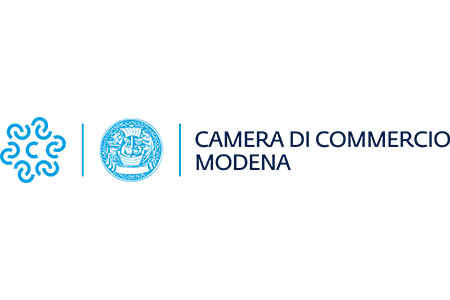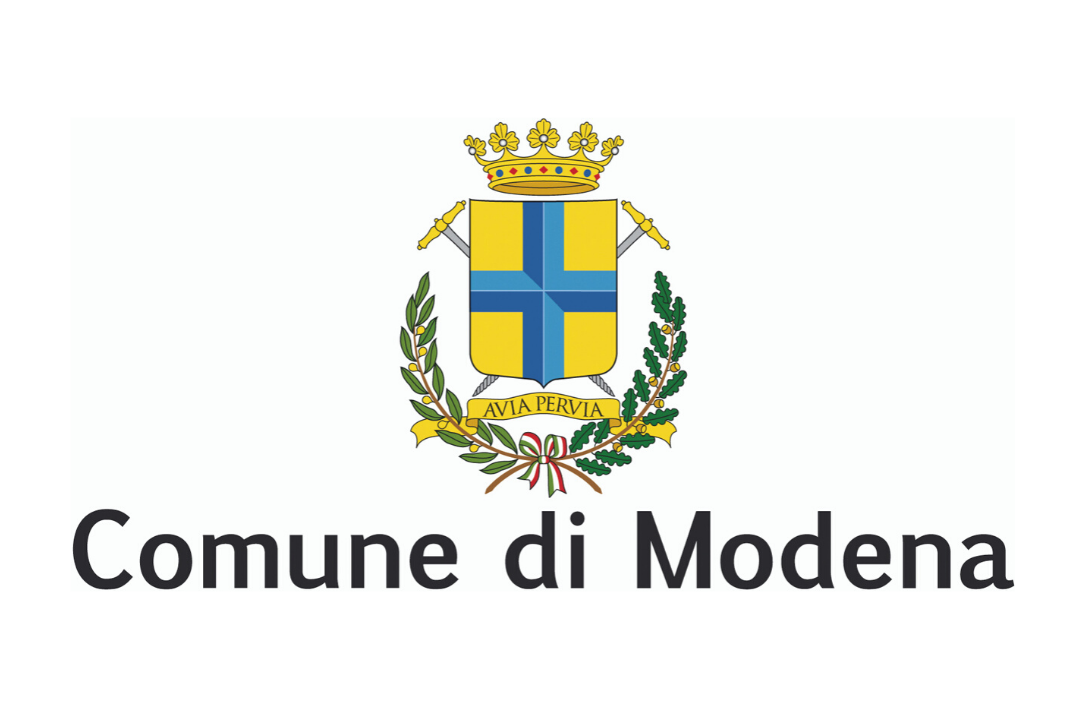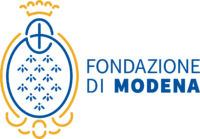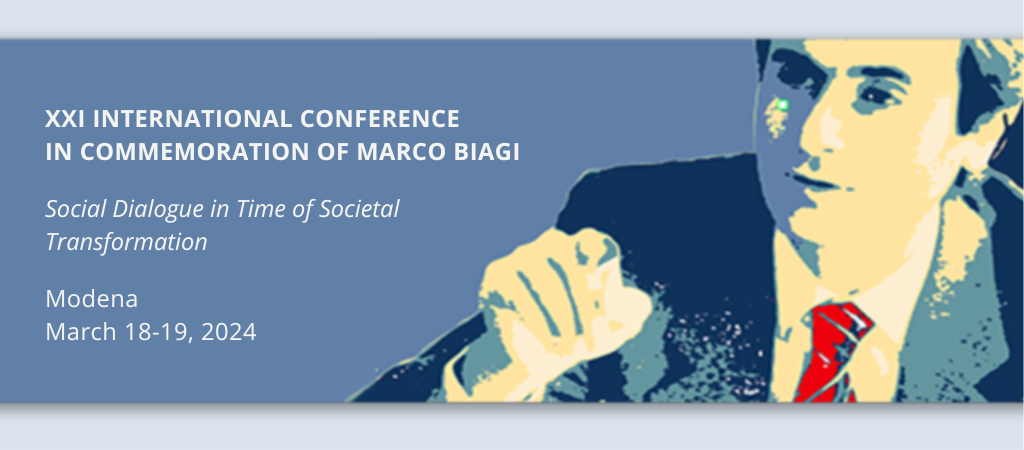Social Dialogue in a Time of Societal Transformation
On the twenty-second anniversary of the death of Professor Marco Biagi, the Foundation and the University of Modena and Reggio Emilia are commemorating the man and the labour law scholar by organizing an international conference on “Social Dialogue in a Time of Societal Transformation”.
Over the two days in which the event is to take place, eminent scholars worldwide will exchange ideas in an interdisciplinary and comparative perspective, exploring the changing dynamics of social dialogue in the face of global transformations and challenges.
One of the Conference’s core issues will be whether social dialogue can maintain autonomy amidst broader societal shifts, including technological advancements, climate change, and changing work patterns. The focus will be on recontextualizing established patterns, identifying innovative practices, and designing new models for interest representation, aiming at addressing existing and future shortcomings and effectively navigating the evolving landscape of social dialogue.
Monday, 18th March 2024
2.00-2.30 pm Attendee’s registration
2.30-2.45 pm Welcome Addresses
Tommaso Fabbri, Vice-president of the Marco Biagi Foundation’s Scientific Committee and Dean of the Marco Biagi Department of Economics, University of Modena and Reggio Emilia;
Gian Carlo Muzzarelli, Mayor of Modena
Alessandra Camporota, Prefect of Modena
Carlo Adolfo Porro, Rector of the University of Modena and Reggio Emilia
2.45 pm – 4.15 pm Plenary
Chair: Tiziano Treu, Catholic University of Milan (Italy); Marco Biagi Foundation (Italy)
Social Partnership and the Law in the UK: Prospects for Renewal?
Ruth Dukes, University of Glasgow (United Kingdom)
Workers’ Voice, Digital Technologies and Quality of Working Life
Valeria Pulignano, KU Leuven (Belgium)
Is Workers’ Participation a Trap?
Giovanni Solinas, University of Modena and Reggio Emilia (Italy)
4.30 pm – 6.00 pm Parallel Sessions
Chair: Carla Spinelli, University Aldo Moro of Bari (Italy)
Strengthening Social Dialogue in the EU Commission Proposal for Recommendation and Communication
Filip Dorssemont, UC Louvain (Belgium)
The role of social partners in the EU economic governance
Pieter Pecinovsky, KU Leuven (Belgium), Université Libre de Bruxelles (Belgium)
What is the Minimum Wage Directive really about?
Luca Ratti, University of Luxembourg (Luxembourg)
Social Partners involvement in the digital transition
Carla Spinelli, University Aldo Moro of Bari (Italy)
Discussant: Edoardo Ales, Parthenope University of Naples, Marco Biagi Foundation (Italy)
Make me good…just not yet? Ireland and the Adequate Minimum Wage Directive
Michael Doherty, Maynooth University (Ireland)
Setting the minimum wage in Lithuania: reality and challenges
Daiva Petrylaite, Vilnius University (Lithuania); Vida Petrylaite, Vilnius University (Lithuania)
Portugal and the Minimum Wage Directive: what really changes?
Ana Teresa Ribeiro, Universidade Católica Portuguesa – Porto Faculty of Law (Portugal)
The tentative impact of the Directive on adequate minimum wages (AMWD) in Hungary in terms of promotion of collective bargaining
Attila Kun, Károli Gáspár University (KRE), Ludovika-UPS (NKE) (Hungary)
Discussant: Valentina Franca, University of Ljubljana (Slovenia)
7.00 pm Holy Mass in memory of prof. Marco Biagi, at Sant’Agostino church (Piazza Sant’Agostino, 6 – Modena)
Tuesday, 19th March 2024
9.30 am – 11.00 am Parallel Sessions 2
Chair: Marianna Russo, University Luigi Vanvitelli of Campania (Italy), Tilburg Law School (The Netherlands)
Are platform work novel challenges repurposing the trade unions as we know them? Italian case study
Eva Lacková, University Luigi Vanvitelli of Campania (Italy)
Technological transformations of trade unions’ activity in the public sector
Giovanna Pistore, University Unitelma Sapienza of Roma (Italy)
Technological transformations of trade union activity in the Italian private sector. Current challenges and prospects
Marianna Russo, University Luigi Vanvitelli of Campania (Italy),Tilburg Law School (The Netherlands)
The trade unions’ contribution to the fight against climate change: the “environmental” strike in the Italian legal system
Francesco Testa, University Luigi Vanvitelli of Campania (Italy)
Discussant: David Mangan, Maynooth University (Ireland)
Chair: Francesco Basenghi, University of Modena and Reggio Emilia (Italy)
Legitimacy without Members? How to guarantee trade union representativeness in Hungary
Tamás Gyulavári, Pázmány Péter Catholic University (Hungary); Gábor Kártyás, Pázmány Péter Catholic University (Hungary)
The decline in collective bargaining coverage: causes, impacts and legal countermeasures
Alexander Stöhr, EBS University of Business and Law (Germany)
Digital trade unionism in the making? Insights from the Italian experience
Chiara Cristofolini, University of Trento (Italy)
Social Partnership, Collective Bargaining and Union Revitalization in Ireland
William Roche, University College Dublin (Ireland); Valentina Paolucci, Maynooth University (Ireland)
Discussant: Paolo Borghi, University of Modena and Reggio Emilia (Italy)
11.15 am – 12.45 pm Parallel Sessions 3
Chair: Ralf Rogowski, University of Warwick (United Kingdom)
Human Rights Due Diligence Processes: what role for trade unions? An analysis focused (mainly) on the EU’s Proposed Directive on Corporate Sustainability Due Diligence
Joana Nunes Vicente, University of Coimbra Institute for Legal Research (Portugal)
French view of sustainable work in a context of work transformations discussed as a part of social dialogue
Céline Teyssier, Center of documentation and European research (CDRE – Center of excellence Jean Monet – EA n° 3004), University of Pau and Pays de l’Adour (France)
The proposal for a European directive on “corporate sustainability due diligence”: the potential for social dialogue, workers’ information and participation rights
Maria Giovannone, Roma Tre University (Italy)
Discussant: Elena Sychenko, University of Modena and Reggio Emilia (Italy)
Chair: Manfred Weiss, J.W. Goethe University of Frankfurt (Germany)
The Consejo Andaluz de Relaciones Laborales: since 1983, a successful institutional model for social dialogue
Stefano Bini, Cordova University (Spain)
A Procedural Justice Theory of Social Dialogue
Matthew Bodie, University of Minnesota Law School (USA); Rebecca Hollander-Blumoff, Washington University School of Law (USA)
EU approach to social dialogue and collective labour rights: It is a hard legacy to leave behind
Silvia Rainone, European Trade Union Institute and KU Leuven (Belgium)
Discussant: John Geary, University College Dublin (Ireland)
2.00 pm – 3.30 pm Parallel Sessions 4
Chair: Frank Hendrickx, KU Leuven (Belgium)
The EU guidelines on collective agreements by solo self-employed, in the light of the ILO acquis for collective bargaining: a momentous change, or just an incomplete puzzle?
Matteo Avogaro, ESADE – Ramon Llull University, IEL – Instituto de Estudios Laborales (Spain)
New steps towards the recognition of a collective status to workers in position of economic dependance – the recent audacity of the Portuguese legislator (Law 13/2023)
Milena da Silva Rouxinol, Portuguese Catholic University, Católica Research Centre for the Future of Law (Portugal)
Old tools for new challenges do not seem to work: Reinventing the social dialogue mechanism for digital nomads
Alexander De Becker, University of Ghent (Belgium); Valentina Franca, University of Ljubljana (Slovenia)
Collective labour law and social anomalies in the light of modern forms of work
Tamás Németh, University of Debrecen Géza Marton Doctoral School of Legal (Hungary)
Discussant: Emanuele Menegatti, University of Bologna (Italy)
Chair: Csilla Kollonay-Lehoczky, Central European University (Hungary)
Where do we stand with the inclusion of vulnerable workers in the European labour market? Trade unions’ new and old objectives compared
Matilde Biagiotti, University of Bologna (Italy)
(Anti)social dialogue. How to talk when we don’t understand each other in a multicultural societies
Izabela Florczak, University of Lodz (Poland)
Collective Representation of Neurodivergent Workers
Olga Rymkevich, Marco Biagi Foundation (Italy)
Discussant: Susan Bisom-Rapp, California Western School of Law (USA)
3.30 pm – 5.00 pm Parallel Sessions 5
Chair: Alan Neal, University of Warwick (United Kingdom)
Are union co-op labor negotiations a win-win and for whom?
Ariana R. Levinson, University of Louisville (USA)
Is the solidarity of trade unions in the automotive industry possible in the absence of a sectoral level of collective bargaining – the case of Poland?
Sławomir Adamczyk, NSZZ Solidarność (Poland); Barbara Surdykowska, NSZZ Solidarność (Poland)
Perspectives of social dialogue in the agricultural sector: a cross and multi-level analysis
Ilaria Purificato, University of Modena and Reggio Emilia, Marco Biagi Foundation (Italy)
Social dialogue within the framework of the ILO committee on freedom of association, and the need to better accommodate workers in the informal economy
Marius Olivier, Nelson Mandela University, North West University (South Africa); University of Western Australia (Australia); Evance Kalula, ILO Committee on Freedom of Association (CFA), University of Cape Town (South Africa), University of Rwanda (Rwanda)
Discussant: Janice Bellace, The Wharton School, University of Pennsylvania, Philadelphia (USA)
Chair: Iacopo Senatori, University of Modena and Reggio Emilia, Marco Biagi Foundation (Italy)
The role of European social dialogue in designing the robotic workplace: between regulation and negotiation
Simon Taes, KU Leuven (Belgium)
The Participation of Third Parties in the Digitalized Workplace and its Implications for Equality – New Thoughts on Corporate Social Responsibility in the Digitalized Workplace
Tammy Katsabian, College of Management Academic Studies (Israel)
Social dialogue in safety and health regulations on remote working: a new challenge for social partners. The case of CEE Member States
Paulina Barańska, NSZZ Solidarność (Poland); Barbara Surdykowska, NSZZ Solidarność (Poland)
Allocation of risk in new forms of employment: The role of social dialogue
Ernestyna Pachała-Szymczyk, University of Warsaw, Centre for International and European Labour Law Studies (CIELLS) (Poland)
Discussant: Alberto Tampieri, University of Modena and Reggio Emilia (Italy)
5.15 pm – 6.30 pm Plenary
Chair: Luigi Enrico Golzio, University of Modena and Reggio Emilia, Marco Biagi Foundation (Italy)
Report from Discussants
Closing remarks: Manfred Weiss, J.W. Goethe University of Frankfurt (Germany)
The event is realized thanks to the contribution of our institutional partners:




with the support of:

Prof. Tindara Addabbo (University of Modena and Reggio Emilia), Prof. Edoardo Ales (University of Naples Parthenope), Prof. Ylenia Curzi (University of Modena and Reggio Emilia), Prof. Tommaso Fabbri (University of Modena and Reggio Emilia), Prof. Marius Olivier (Nelson Mandela University, South Africa and University of Western Australia), Prof. Iacopo Senatori (University of Modena and Reggio Emilia).
Dr Carlotta Serra (Marco Biagi Foundation, Chair), Prof. William Bromwich (University of Modena and Reggio Emilia, Marco Biagi Foundation), Dr Elisa Cavini (Marco Biagi Foundation), Dr Arianna Di Iorio (Marco Biagi Foundation), Dr Margherita Grillo (Marco Biagi Foundation), Dr Olga Rymkevich (Marco Biagi Foundation), Dr Federica Palmirotta (University of Modena and Reggio Emilia-Marco Biagi Foundation), Dr Ilaria Purificato (University of Modena and Reggio Emilia-Marco Biagi Foundation).
Prof. Marina Orlandi Biagi (Marco Biagi Foundation, Chair), Prof. Tindara Addabbo (University of Modena and Reggio Emilia), Prof. Edoardo Ales (University of Naples Parthenope), Prof. Francesco Basenghi (University of Modena and Reggio Emilia), Prof. Janice Bellace (The Wharton School, Philadelphia), Prof. Susan Bisom-Rapp (California Western School of Law), Prof. Ylenia Curzi (University of Modena and Reggio Emilia), Prof. Tommaso Fabbri (University of Modena and Reggio Emilia), Prof. Luigi E. Golzio (University of Modena and Reggio Emilia), Prof. Frank Hendrickx (University of Leuven, Belgium), Prof. Csilla Kollonay-Lehoczky (Central European University, Budapest), Prof. Alan Neal (University of Warwick), Prof. Roberto Pinardi (University of Modena and Reggio Emilia), Prof. Ralf Rogowski (University of Warwick), Prof. Riccardo Salomone (University of Trento), Prof. Iacopo Senatori (University of Modena and Reggio Emilia), Prof. Yasuo Suwa (Hosei University), Prof. Tiziano Treu (Catholic University of Milan), Prof. Manfred Weiss (J.W. Goethe University, Frankfurt-am-Main).
